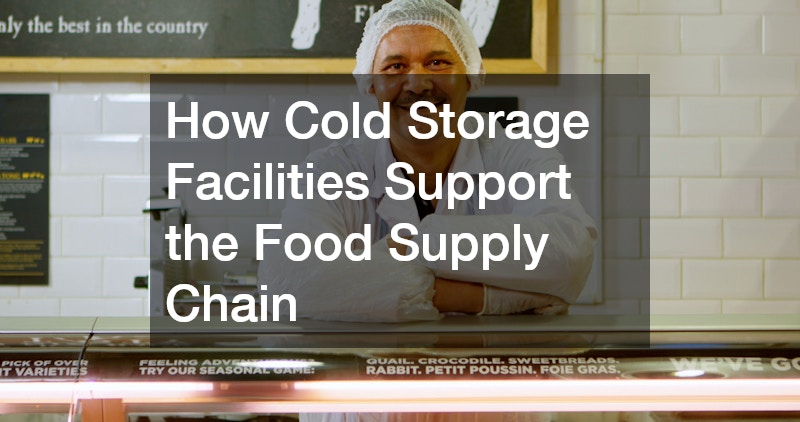
Ensuring that food reaches consumers safely and efficiently is more important than ever. Cold storage facilities play a crucial role in the food supply chain by providing temperature-controlled environments that preserve the quality and safety of perishable goods. From fresh produce and dairy products to meat, seafood, and frozen foods, cold storage helps maintain the integrity of food from farm to table, reducing waste and supporting a reliable supply chain.
Preserving Food Quality
One of the primary functions of a cold storage facility is to maintain the quality of food products. Temperature control slows down the natural process of spoilage and bacterial growth, which can occur quickly in perishable goods. For example, fresh fruits and vegetables require specific temperature ranges to remain crisp and nutritious, while dairy products like milk and cheese need consistent cold conditions to prevent souring. By storing food at the right temperatures, cold storage facilities ensure that consumers receive fresh, high-quality products, enhancing customer satisfaction and trust.
Reducing Food Waste
Food waste is a significant challenge worldwide, with millions of tons of food lost each year due to spoilage during transportation or improper storage. Cold storage facilities help reduce this waste by extending the shelf life of perishable goods. When food is stored under optimal conditions, it remains safe and consumable for longer periods, allowing retailers, distributors, and consumers more time to use it. This not only benefits the environment by minimizing waste but also helps businesses save money and improve operational efficiency.
Enabling Efficient Distribution
Cold storage facilities are an essential link in the distribution network for perishable foods. They act as hubs where products can be safely stored before being transported to retail locations, restaurants, or export markets. By strategically placing cold storage facilities near production centers or distribution routes, companies can streamline logistics, reduce transportation times, and ensure that products reach their destinations in optimal condition. This efficiency is particularly critical for international food trade, where goods may travel long distances and require reliable temperature control throughout the journey.

Supporting Seasonal and Local Produce
Cold storage facilities also play a key role in supporting seasonal and locally grown produce. Many fruits and vegetables are only available during certain times of the year, but cold storage allows these products to be stored and distributed beyond their natural harvest periods. For example, winter apples or summer berries can be preserved and delivered year-round, giving consumers access to a wider variety of fresh produce. This capability not only benefits consumers but also helps farmers and local producers maximize profits by reducing losses from unsold or spoiled crops.
Ensuring Food Safety
Food safety is a top priority in the supply chain, and cold storage facilities help prevent contamination and foodborne illnesses. Maintaining strict temperature controls and hygienic storage practices reduces the risk of bacterial growth, mold, and other pathogens. Additionally, many modern cold storage facilities are equipped with monitoring systems that track temperature, humidity, and other environmental factors in real time. This allows for immediate corrective action if conditions fall outside acceptable ranges, ensuring that food remains safe for consumption throughout storage and transportation.
Supporting the Frozen Food Industry
The frozen food industry relies heavily on cold storage to maintain product integrity. From frozen vegetables and ready-to-eat meals to ice cream and seafood, maintaining a consistent low temperature is crucial. A cold storage facility provide long-term storage solutions that allow frozen foods to be transported over long distances without compromising quality. This capability has also enabled the growth of e-commerce and grocery delivery services, which require reliable cold storage to deliver frozen and refrigerated items directly to consumers’ doors.
Facilitating Compliance with Regulations
Food storage and transportation are heavily regulated to protect public health. Cold storage facilities help businesses comply with these regulations by providing controlled environments that meet industry standards for temperature, hygiene, and safety. Many facilities are designed to adhere to food safety certifications such as HACCP (Hazard Analysis Critical Control Points) or ISO standards. Compliance not only minimizes the risk of legal issues but also builds consumer confidence in the safety and quality of the food products being sold.
Supporting Global Trade and Supply Chains
Global food trade depends on cold storage to transport perishable goods across continents. Products like tropical fruits, seafood, and specialty cheeses require precise temperature control from origin to destination. Cold storage facilities, combined with refrigerated transportation, make it possible for consumers to enjoy foods from around the world, regardless of seasonal availability. This interconnected supply chain relies on the efficiency, reliability, and technological capabilities of cold storage facilities to meet growing global demand.
Adapting to Evolving Consumer Demands
Modern consumers increasingly demand fresh, high-quality, and diverse food options. Cold storage facilities enable retailers and distributors to meet these expectations by storing a wide range of products under optimal conditions. Additionally, as online grocery shopping and meal delivery services expand, cold storage plays a critical role in ensuring products remain fresh during storage and transit. By adapting to changing consumer behavior, cold storage facilities support a flexible and resilient food supply chain.
Cold storage facilities are a vital component of the food supply chain, ensuring that perishable products remain safe, fresh, and high-quality from production to consumption. By preserving food, reducing waste, supporting efficient distribution, and maintaining compliance with safety regulations, these facilities help businesses operate effectively while meeting consumer expectations. From local markets to global trade, cold storage plays an indispensable role in sustaining the modern food supply chain, proving that temperature-controlled storage is much more than just a warehouse—it’s a critical link in the journey from farm to table.



